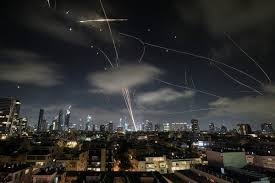In a dramatic turn of events that could reshape the geopolitical landscape of the Middle East, the United States, in a joint operation with Israel, launched coordinated airstrikes on three of Iran’s most critical nuclear facilities: Fordow, Natanz, and Isfahan.
The pre-dawn attack on June 22, 2025, marks the most significant military action between the nations in over a decade, raising fears of a broader regional conflict.
A Decisive Move by the United States
According to U.S. defense officials, the operation involved long-range B-2 stealth bombers deployed from American bases, including those stationed in Missouri and Guam.
The aircraft were equipped with GBU-57 "bunker-buster" bombs, specifically designed to penetrate fortified underground structures such as those found at Iran’s nuclear sites.
The strikes reportedly targeted infrastructure believed to be critical to Iran’s uranium enrichment capabilities.
President Donald Trump, speaking from the White House, declared the mission a “resounding success,” stating that Iran’s nuclear ambitions had been “severely crippled.” He emphasized that the U.S.
will take further action if Iran continues to defy international nuclear agreements and threatens regional stability. “We will not allow a nuclear Iran. This was a necessary step for peace,” Trump said.
Iran Vows Retaliation
The Iranian government responded furiously, labeling the attacks as an act of war. Iran’s Supreme National Security Council convened an emergency session and vowed to retaliate “with equal or greater force.”
Iranian state media reported that missiles were fired toward Israeli military positions in the Golan Heights in response to the strikes.
Iranian President Ebrahim Raisi called the attacks “outrageous” and warned that they would have “everlasting consequences.” He insisted that Iran retains the sovereign right to pursue peaceful nuclear energy and that any aggression would be met with “unshakable resistance.”
Global Reactions and Fears of Wider War
The airstrikes have drawn mixed reactions from world leaders. The United Nations Security Council scheduled an emergency meeting to address the sudden escalation. European leaders, including those from France and Germany, expressed concern over the situation spiraling into a broader war, urging both sides to show restraint and return to diplomatic dialogue.
Russia and China condemned the strikes, calling them a violation of international law and warning that continued aggression could destabilize the entire region. Meanwhile, countries in the Gulf, particularly Saudi Arabia and the UAE, have raised their alert levels and increased security around key oil infrastructure.
Damage Assessment and Nuclear Concerns
Early satellite imagery and intelligence reports indicate that substantial damage was done to facilities at Natanz and Isfahan, both known to house advanced centrifuges. However, the International Atomic Energy Agency (IAEA) released a preliminary statement indicating that no unusual radiation levels have been detected, suggesting no breach of nuclear material containment—at least for now.
Still, nuclear experts warn that the damage could set Iran’s nuclear program back by years, while simultaneously hardening its resolve to operate covertly. “Strikes like these will not eliminate Iran’s nuclear capabilities entirely,” said a former UN weapons inspector. “They may simply push the program deeper underground.”
The Road Ahead: Uncertainty and Anxiety
As the world watches anxiously, questions loom over what comes next. Will Iran escalate further, drawing in more regional powers? Will the U.S. maintain its military posture in the Gulf, or push for negotiations from a position of strength? The answers remain uncertain, but what is clear is that the fragile balance of power in the Middle East has shifted dramatically overnight.
Analysts agree that diplomacy must now play a central role to prevent a full-scale war. Yet, in the immediate aftermath of the bombings, both Washington and Tehran appear entrenched in their positions, with little room for compromise.
For now, the skies over the Persian Gulf remain tense, the ground unstea
dy, and the world holds its breath.














.jpg)
.jpg)




0 Comments